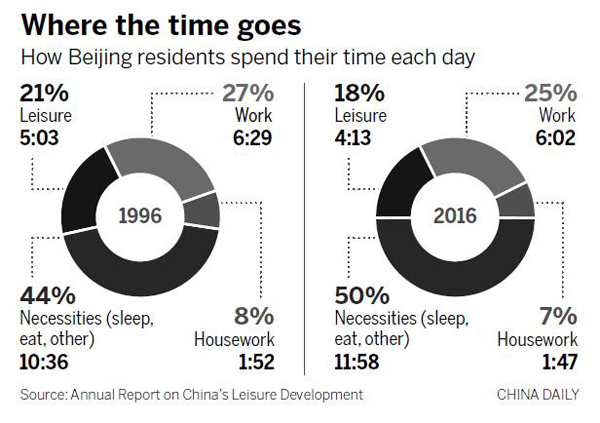Report: Fewer hours spent on the job
People in Beijing are spending less time at work than they did 20 years ago but also less time on leisure activities, according to a new survey.
The average resident's work time was six hours and two minutes per day last year, a decrease of 27 minutes from 1996, according to the Annual Report on China's Leisure Development, which was released on Wednesday.
The findings are based on questionnaires completed by about 830 Beijing residents last year and more than 430 in 1996.
The survey also found that the average time respondents spent on daily necessities, such as sleeping and eating, increased by 82 minutes to 11 hours and 58 minutes.
The time spent sleeping rose by 43 minutes to eight hours and 58 minutes, while time for eating went up by 29 minutes to one hour and 56 minutes. Women tended to spend more time sleeping, both in 2016 and 1996, according to the report, which was compiled by the Chinese Academy of Social Sciences' Tourism Research Center.
The change in how people spend their time arises from several factors, according to Wang Qiyan, director of Renmin University of China's Leisure Economy Research Center, who led the study.
"The development and improvement of science and technology has led to a surge in production efficiency, which enables people to work less and rest more," said Wang, a professor of statistics.
"In addition, after decades of continuous, high-speed economic growth since reform and opening-up in 1978, the economy has gradually slowed in recent years. And people have also changed to their own pace of living and tried to enjoy life."
The survey also found that housework, including shopping, cooking and tidying up, take up less time for Beijing residents than in the past, although the one hour and 47 minutes a day spent on housework last year is only five minutes less than 20 years ago.
Wang said the emergence of online shopping and the development of the logistics sector have provided more convenience to residents and contributed to lesstime for housework.
The wide use of electrical appliances, such as microwave ovens, as well as the increasing popularity of takeout food, has greatly reduced the time people spend cooking meals, Wang added.



























